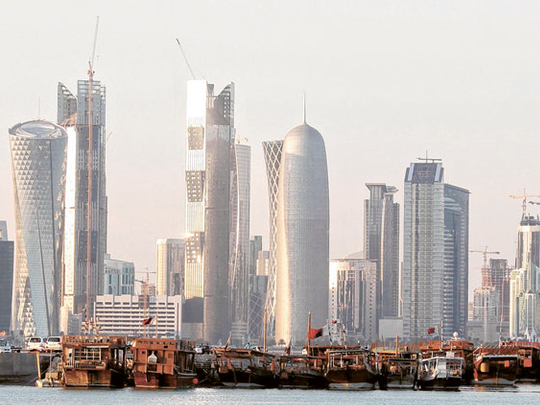
Latest available statistics point to increasing rather than decreasing significance of the petroleum sector, both oil and gas, in the Qatari economy. Certainly, this is no positive piece of news, as it places prosperity of Qatari economy at the mercy of developments in the volatile oil market.
Determination of a formula for oil prices is not an exact science by virtue of it being affected by diverse factors including socio-political and socio-economic developments on a global level including Libya's clashes and Greece's debt problem.
According to the March 2011 issue of the Quarterly Statistical Bulletin published by Qatar Central Bank (QCB), the petroleum sector contributed 57 per cent to the gross domestic product (GDP) in 2010, up from 46 per cent in 2009.
Undoubtedly, this is an excessive contribution from a single sector to all economic activities in a single year. Conversely, other Gulf Cooperation Council (GCC) countries are less dependent on the petroleum sector with regards to GDP contribution.
The petroleum sector accounts for about one third of Bahrain's GDP.
In reality, stronger contribution of the petroleum sector is partly due to firm oil prices on the one hand and declining returns on investments. It seems investment outcome relates to adverse developments in international markets, the debt problem in several EU countries as well as changing values of hard currencies.
Expectations
The same QCB report puts the value of the country's GDP at $128 billion (Dh470 billion) in 2010, certainly not far away from the $131 billion of Kuwait for the same year. However, GDP growth rates are to the advantage of the Qatari economy.
For 2011, the IMF expects the economies of Qatar and Kuwait to grow by 11 per cent and 4.5 per cent in 2011, respectively. Economic growth rate in Qatar surpasses the average of 7.8 per cent for GCC for the year.
As such, the Qatari economy is on its way to replace Kuwait as the third largest GDP within the six-nation grouping of GCC after Saudi Arabia and the UAE. Best available statistics put the value of GDP of Saudi Arabia and the UAE at $443 billion and $273 billion, respectively.
On another front, preliminary figures suggest the petroleum sector accounts for 61 per cent of total treasury income for fiscal year 2010-2011.
By comparison, the sector contributed 49 per cent of its total income in fiscal year 2009-2010. Similar to Kuwait within GCC countries, the fiscal year starts in April in Qatar and ends in March.
Interestingly, QCB figures put total revenues at $38.6 billion in fiscal year 2009-2010, down from $46.3 billion in 2010-2011. The change reflects a sharp drop of the investment category together with rising oil income, as it is the case with GDP statistics.
Still, chances are the structure of fiscal year 2011-2012 would not be different in a material way.
Stronger income
To be sure, the authorities prepared the budget with revenues and expenditures of $44.5 billion and $38.3 billion, respectively. Yet, stronger income is projected not least because of assuming an oil price rate of $55 per barrel. The figure is considerably below prevailing rates in the market, widely expected to remain above $100 per barrel for the entire year.
As indicated above, the petroleum sector is the primary source of income for the fiscal system, with price changes in either direction leaving their imprints on budgetary performance.
Looking forward, activities related to World Cup 2022 in Qatar should help augmenting contributions of other sectors like services and construction in the GDP at the expense of the petroleum sector, hence boosting the cause of economic diversification.
The writer is a Member of Parliament in Bahrain.












